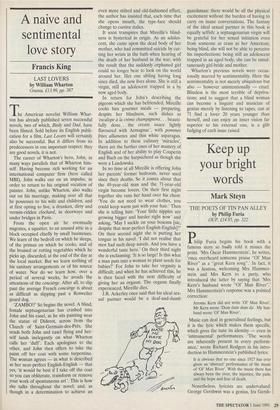A naive and sentimental love story
Francis King
LAST LOVERS by William Wharton Granta, £13.99, pp. 387 The American novelist William Whar- ton has already published seven successful novels, two of which, Birdy and Dad, have been filmed. Sold before its English publi- cation for a film, Last Lovers will certainly also be successful. But it differs from its predecessors in one important respect: they are good novels, it is not.
The career of Wharton's hero, John, in many ways parallels that of Wharton him- self. Having become rich working for an international computer firm (here called MBI), John walks out on an impulse, in order to return to his original vocation of painter. John, unlike Wharton, also walks out on his marriage, making over all that he possesses to his wife and children, and at first opting to live, a drunken, dirty and vermin-ridden clochard, in doorways and under bridges in Paris.
From the open air he eventually migrates, a squatter, to an unused attic in a block occupied chiefly by small businesses. We learn of the bedroll on which he sleeps, of the primus on which he cooks, and of the bruised or rotting vegetables which he picks up, discarded, at the end of the day at the local market. But we learn nothing of his sanitary arrangements or of his source of water. Nor do we learn how, over a period of several weeks, he avoids the attentions of the concierge. After all, to slip past the average French concierge is about as difficult as slipping past a Rotweiler guard dog.
`ZAMBOW So begins the novel. A blind, female septuagenarian has crashed into John and his easel, as he sits painting near the statue of Diderot, across from the Church of Saint-Germain-des-Pres. She sends both John and easel flying and her- self lands inelegantly on what Wharton calls her 'duff'. Each apologises to the other, and John then offers to take the paint off her coat with some turpentine. The woman agrees — in what is described as her near-perfect English-English — that yes, 'it would be best if I take off the coat so you can obliterate, transform or remove your work of spontaneous art '. This is how she talks throughout the novel; and, as though in a determination to achieve an even more stilted and old-fashioned effect, the author has insisted that, each time that she opens mouth, the type-face should change to cursive italics.
It soon transpires that Mireille's blind- ness is hysterical in origin. As an adoles- cent, she came upon the dead body of her mother, who had committed suicide by cut- ting her wrists in the bath when hearing of the death of her husband in the war; with the result that the suddenly orphaned girl could no longer bear to look on the world around her. Her one sibling having long since died, she now lives alone. She is still a virgin, still an adolescent trapped in a by now aged body.
In return for John's describing the pigeons which she has befriended, Mireille cooks him gourmet meals — preparing, despite her blindness, such dishes as `escalope a la creme champignons. . beauti- fully done. . . the cream sauce lightly flavoured with Armagnac', with pommes frites allumettes and thin white asparagus. In addition to these culinary 'miracles', there are the further ones of her mastery of English and of her ability to play Couperin and Bach on the harpsichord as though she were a Landowska.
In no time at all Mireille is offering John her parents' former bedroom, never used since their deaths. So it comes about that the 49-year-old man and the 71-year-old virgin become lovers. On their first night together she runs her hand over his chest: `You do not need to wear clothes, you could keep warm just with your hair.' Then she is telling him: 'Your little nipples are growing bigger and harder right now' and asking, 'May I suckle on your bosoms [sic, despite that near-perfect English-English]?' On their second night she is putting her tongue in his navel: 'I did not realise that men had such deep navels. And you have a wonderful taste here.' On their third night she is exclaiming: 'It is so large! Is this what a man puts into a woman to plant seeds for babies?' For John to take her virginity is difficult; and when he has achieved this, he is then faced with the next difficulty of giving her an orgasm. The orgasm finally experienced, Mireille dies. J.R. Ackerley once said that his ideal sex- ual partner would be a deaf-and-dumb guardsman: there would be all the physical excitement without the burden of having to carry on inane conversations. The fantasy of the ideal sexual partner in this book is equally selfish: a septuagenarian virgin will be grateful for her sexual initiation even from someone as crass as her American; being blind, she will not be able to perceive his imperfections; being still an adolescent trapped in an aged body, she can be simul- taneously girl-bride and mother.
Wharton's previous novels were occas- ionally marred by sentimentality. Here the sentimentality is not merely ubiquitous but also — however unintentionally — cruel. Blindess is the most terrible of depriva- tions; and to suggest that a blind woman can become a linguist and musician of genius merely by listening to tapes, can at 71 find a lover 20 years younger than herself, and can enjoy an inner vision far superior to his external one, is a glib fudging of each issue raised.


















































 Previous page
Previous page